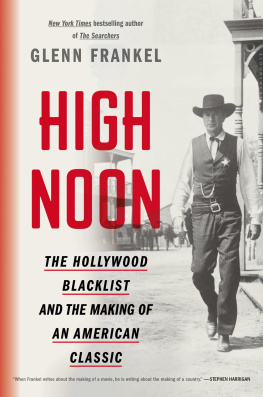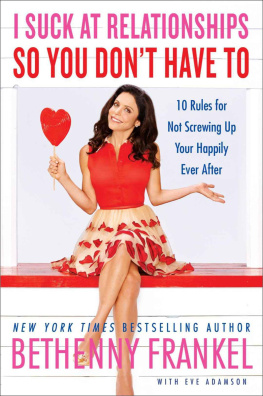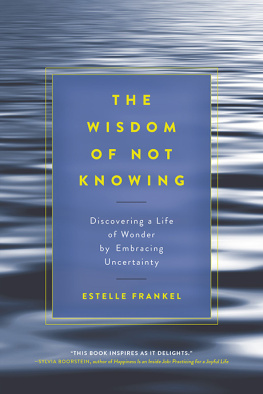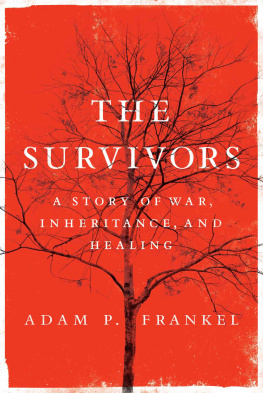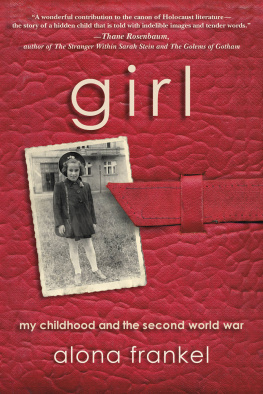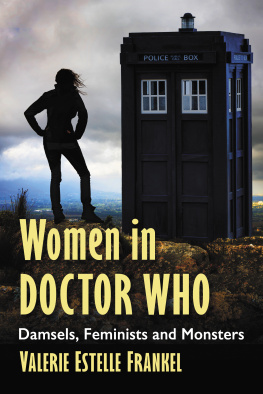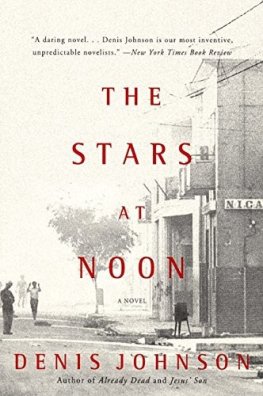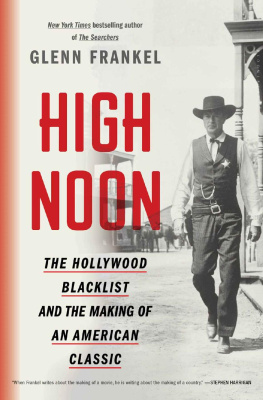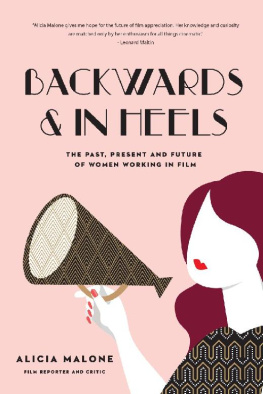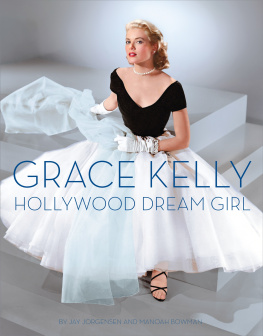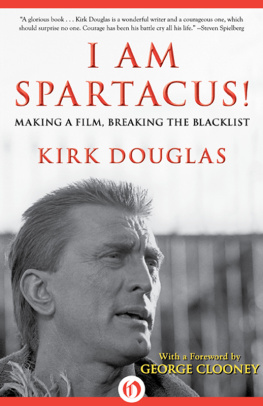
More Praise for High Noon
Though Frankel began this sumptuous history long before the latest election, he ends up reminding us that 2016 was far from the first time politicians trafficked in lies and fear, and showing us how, nonetheless, people of integrity came together to do exemplary work. The Washington Post
Mixing elements of biography, social history and film analysis, author Glenn Frankel uncovers drama and tragedy not usually found in discussions of moviemaking. His detailed narrative is a primer for those who dont understand how the blacklist era endangered free speech and other constitutional values. Associated Press
Frankel reviews the now familiar history of the blacklist with grace and accuracy; his descriptions of witness testimony are particularly vivid... Fascinating. Los Angeles Times
Frankel paints a devastating picture of a powerful force crumbling under oppressiona cautionary tale in borrowed cowboy hats... High Noon is a sharp social history that reminds us just how common for a broken system to abuse its power and cause deep human damagethe worst is coming, any secondbut also that a little cynicism can be useful. Kane defends a worthless city; Kane wins. There are no clean endings, except in the movies. NPR.org
So much has been written about the blacklists perpetrators and victims that you might be forgiven for thinking you know all there is worth knowing, but Frankel offers new details and fresh insights. His portrait of Gary Coopers life and career is equally incisive... It will almost surely stand as the definitive document about this landmark movie. I cant wait to see what subject this skilled journalist will tackle next. Leonard Maltin
[A] compelling new book... The real strength of Frankels account lies in its illustration, in many shades of gray, of the Hollywood blacklist and what it did, in practical terms, as it ruined or derailed many, many careers... The Red Scare Hollywood era is familiar nonfiction territory, but Frankel makes it vital and gets down to the roots. Chicago Tribune
Film historian Glenn Frankel profiles the times, the movie and its message in his fascinating and revealing new book High Noon... Frankelwho previously uncovered the backstory of the classic John Wayne movie The Searcherssays the blacklist marked a uniquely grim time in American history, one with special resonance today. The Christian Science Monitor
Glenn Frankel has endowed the term film historian with a sweeping new dimension. High Noon is full of scholarly insight, compelling history, and wonderfully dishy moments, but like his previous book on The Searchers, it is also an American chronicle of real consequence. When Frankel writes about the making of a movie, he is writing about the making of a country. Stephen Harrigan, author of The Gates of the Alamo and A Friend of Mr. Lincoln
The blacklist has provided grist for many books, including Victor Navaskys seminal study Naming Names. But Frankels book feels fresh nonetheless... He brings out the drama and the no-win situation of everyone who was called before HUAC: throw your friends and colleagues under the bus by naming them as former or current Communists or sympathizers, or watch your life and career go up in flames. The Dallas Morning News
Film buffs and history aficionados will be delighted and riveted by Glenn Frankels insightful and intimate look at the making of the classic 1952 western High Noon... Frankels saga presents a gripping and coherent picture of the corrupt politics, paranoia and fear mongering that drove Hollywood studio heads to capitulate to anti-Communist witch-hunters. Shelf Awareness
Glenn Frankels High Noon isnt just everything you always wanted to know about an enduring classic; its a deeply insightful portrait of the forces in postwar America and in blacklist-era Hollywood that made the film such a powerful product of such a troubled moment. Mark Harris, author of Pictures at a Revolution and Five Came Back
Not far removed from a James Ellroy novel. The 1950s film industry portrayed in High Noon is, like Ellroys Los Angeles, stocked with hard-core commies, idealistic fellow travelers, paranoid Red-baiters, union busters, corrupt congressmen, power-hungry gossip columnists, secretive FBI agents and their snitches, philandering actors and eager starlets. But far from being a Hollywood Babylon of the Red Scare, Frankels book is a detailed investigation of the way anti-communist persecution poisoned the atmosphere around one film, which succeeded nonetheless, and damaged the lives of the people who made it. Bookforum
An absorbing account of how a routine 1952 western starring a has-been and an unknown became an unexpected classic... This story of politics, art, loyalty and conscience is more relevant than ever. And a nice bonus: Although it may impart a civics lesson, it doesnt read like one. Minneapolis Star Tribune
Glenn Frankels High Noon is three splendid books in one: a moment-by-moment account of the making of the classic Western, a history of the Hollywood blacklist with much new material based on primary research, and, in the rise of Stanley Kramer Productions, the story of the independent producers who gradually supplanted conventional studio production. Even if we know how each story ends, its never less than a continuously fascinating read. Scott Eyman, author of John Wayne: The Life and Legend
HIGH NOON
To My Parents,
Herbert and Betty Frankel,
With Love and Gratitude
BY THE SAME AUTHOR
The Searchers: The Making of an American Legend
Rivonias Children: Three Families and the Cost of Conscience in White South Africa
Beyond the Promised Land: Jews and Arabs on the Hard Road to a New Israel

CONTENTS
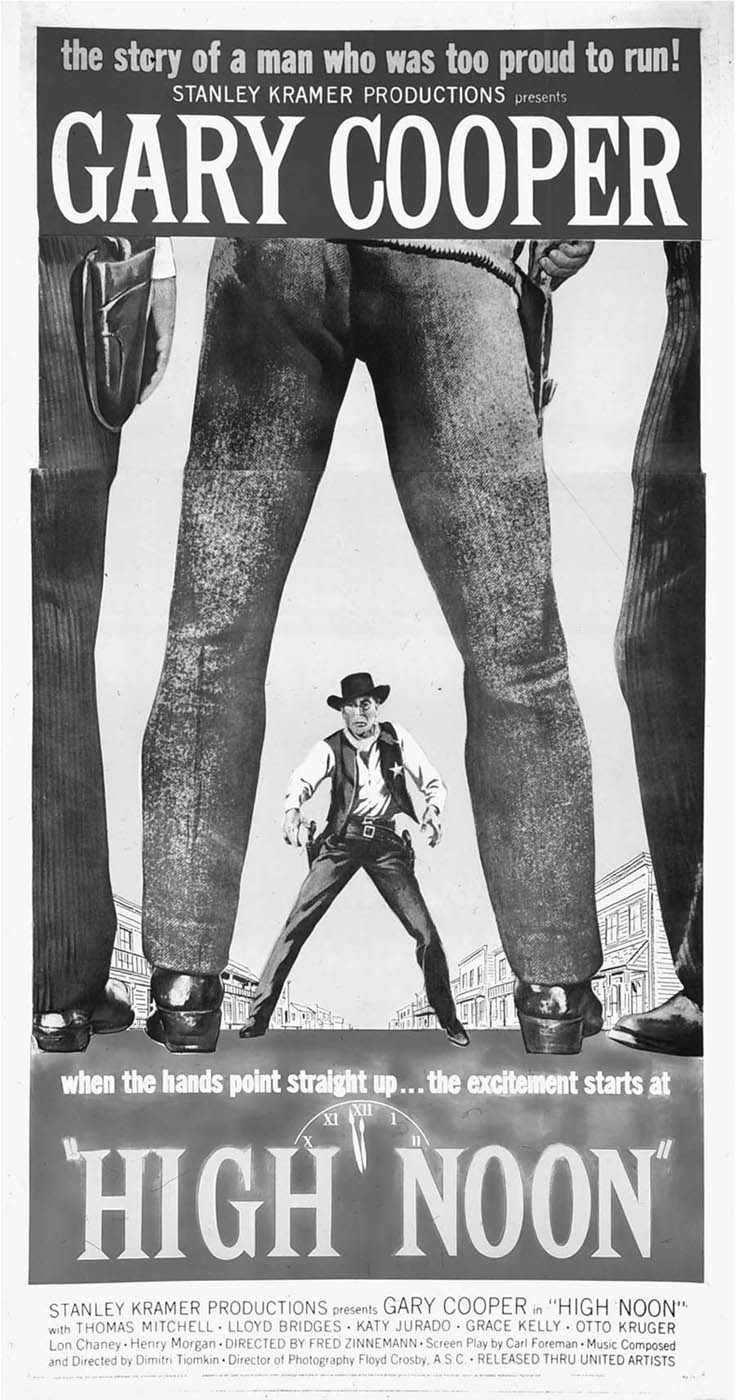
United Artists/Photofest
by the kinds of challenges he cannot walk away from.
ARTHUR MILLER
It is one of Hollywoods most iconic images: one man walking down a deserted Western street toward a showdown with four armed killers. For more than sixty years, High Noon, starring Gary Cooper, has embedded itself in our culture and our national memory. Its title itself has become legendary, connoting a moment of truth when a good man must confront evil. It has been beloved by presidents, ordinary moviegoers, and even political movementsmost notably in 1989 when Solidarity used the image as its main campaign poster in Polands first democratic electionas a symbol of courage and determination in the face of overwhelming odds.
Shot in thirty-two days on a shoestring budget, with its famous star working for a fraction of his normal wage, High Noon was something of an afterthought for those who made it, a rush job to fulfill the tail end of an old contract. Yet it vaulted almost immediately to critical acclaim and box-office success. Its taut narrative, powerful performances, evocative theme song, and climactic shootout made it an instant classic. It won four Academy Awards, including best actor for Cooper. Even today it is considered one of the most enduringly popular films of Hollywoods golden age, on a short list with Gone With the Wind,
Next page
